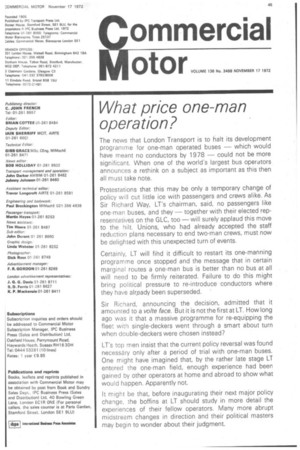What price one-man operation?
Page 51

If you've noticed an error in this article please click here to report it so we can fix it.
The news that London Transport is to halt its development programme for one-man operated buses — which would have meant no conductors by 1978 — could not be more significant. When one of the world's largest bus operators. announces a rethink on a subject as important as this then all must take note.
Protestations that this may be only a temporary change of policy will cut little ice with passengers and crews alike. As Sir Richard Way, LT's chairman, said, no passengers like one-man buses, and they — together with their elected representatives on the GLC, too — will surely applaud this move to the hilt. Unions, who had already accepted the staff reduction plans necessary to end two-man crews, must now be delighted with this unexpected turn of events.
Certainly, LT will find it difficult to restart its one-manning programme once stopped and the message that in certain marginal routes a one-man bus is better than no bus at all will need to be firmly reiterated. Failure to do this might bring political pressure to re-introduce -conductors where they have already been superseded.
Sir Richard, announcing the decision, admitted that it amounted to a volte face. But it is not the first at LT. How long ago was it that a massive programme for re-equipping the fleet with single-deckers went through a smart about turn when double-deckers were chosen instead?
LT's top men insist that the current policy reversal was found necessary only after a period of trial with one-man buses. One might have imagined that, by the rather late stage LT entered the one-man field, enough experience had been gained by other operators at home and abroad to show what would happen. Apparently not.
It might be that, before inaugurating their next major policy change, the boffins at LT should study in more detail the experiences of their fellow operators. Many more abrupt midstream changes in direction and their political masters may begin to wonder about their judgment.
































































































































































